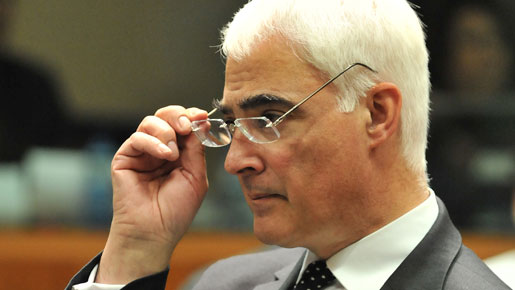
British finance minister Alistair Darling has refused to rule out future tax rises to cut a gaping budget deficit.
Darling is due to publish the budget for the next financial year on March 24, the last major economic showpiece before an election widely expected on May 6 when the Labour Party faces a tough fight to cling to power.
British media interpreted remarks by Darling’s deputy, Liam Byrne, to mean the Labour government did not need further tax rises to meet its goal of halving Britain’s £178bn ($270bn) budget deficit in four years starting next year.
But Darling, the Chancellor of the Exchequer, would give no such assurance. “No Chancellor is ever going to say they’re never going to change the tax system at all over the next five, 10 years or whatever,” he told reporters.
The main election battle is over how fast and deep to cut the deficit, forecast to exceed 12 percent of GDP this year.
The Conservatives say Britain risks a crisis of investor confidence unless it starts cutting the deficit this year. Labour, in power for the last 13 years, says turning off the spending taps now risks aborting the economic recovery that began in the final quarter of 2009.
Possible hung parliament
Two new polls pointed to an indecisive election, with one suggesting Labour would emerge as the biggest party and the other giving the edge to the Conservatives.
The “hung parliament” scenario frightens markets which fear it would hamstring efforts to cut the deficit.
Britain will have its first televised leadership debates during the campaign. The BBC said it was finalising plans for nine other televised debates between ministers and their opposition counterparts on areas such as the economy, defence, immigration and environment.
Separately, Transport Secretary Andrew Adonis told the BBC the Labour Party’s election manifesto would contain firm proposals for an elected upper chamber of parliament, replacing the current unelected House of Lords.
Darling said the government would not publish a spending review, which typically sets out spending plans for the next three years, before the election.
“But of course one has got to be done this year because our current spending runs out at the end of March 2011,” he said.
The government has announced various measures to tackle the deficit, including a rise in national insurance contributions, a one-off tax on bank bonuses and a new 50 percent income tax rate for high earners that is due to take effect in April.
Darling indicated he would put off further belt-tightening measures until the economy had strengthened.
“The main bulk of what we do I believe should start once we know that recovery is established,” he said.
Prime Minister Gordon Brown said that when people saw the budget “they’ll see the plan for the future, which includes the halving of the deficit. We’ve got that under control”.
“But at the same time we are not going to cut frontline services for health and education and policing and … we’re going to invest in the future,” he told the BBC.
Darling’s Conservative opposite number, George Osborne, told reporters he regarded the 50 percent tax rate as “a temporary feature” of the tax system.
But he said he could not think of lowering it while at the same time asking public sector workers to accept a pay freeze as the Conservatives plan to do in 2011-12.

